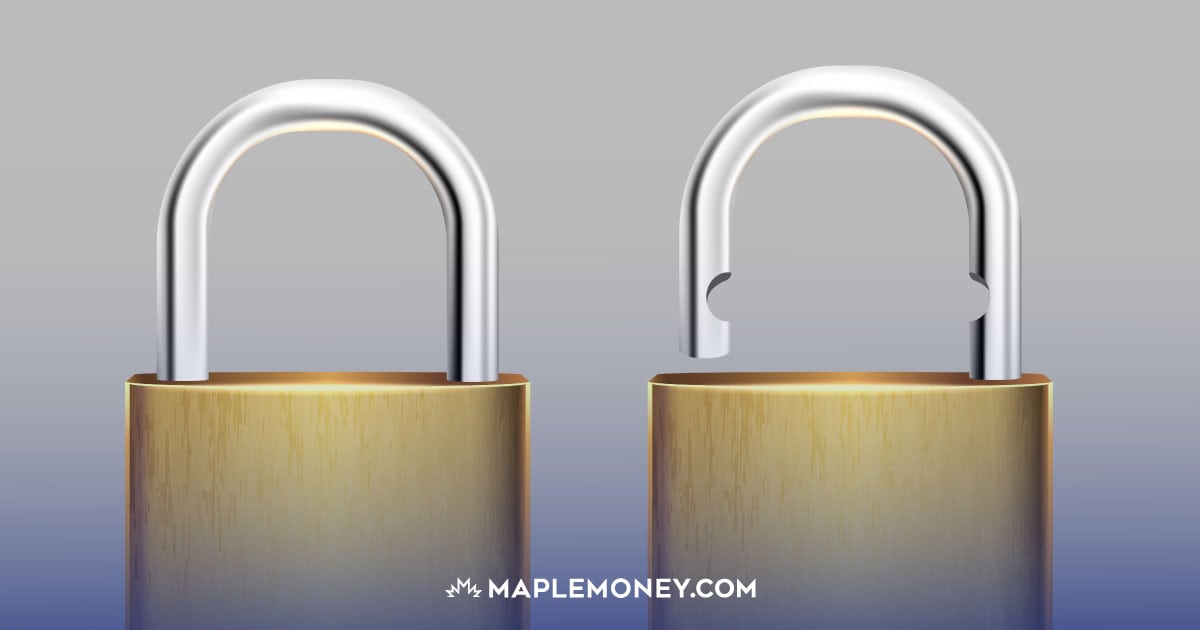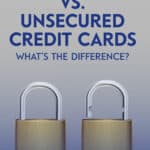Secured vs. Unsecured Credit Cards: What’s the Difference?

When it comes to managing your finances and building a solid credit history, credit cards play a crucial role. But if you have no previous credit history or bad credit, getting approved for a regular credit card can prove challenging. That’s where secured credit cards come in.
In this article, I’ll explain how secured credit cards work and let you know how they are similar (and different) from regular credit cards.
What Is a Secured Credit Card?
A secured credit card is a type of credit card designed for people looking to build or rebuild their credit history. Unlike traditional credit cards, secured cards require you to provide a security deposit upfront, which acts as collateral in case you default on your payments.
This deposit lowers the risk for the issuer, making it easier for you to get approved for a secured credit card even with a poor credit history or no credit history at all.
When you use a secured credit card, your spending habits and payment history are reported to the credit bureaus just like a regular credit card. This means that by using your secured card responsibly and making timely payments, you can improve your credit score over time.
The credit limit on a secured credit card is usually based on the amount of your security deposit. For example, if you provide a $500 deposit, your credit limit will typically be around that amount, although it can vary depending on the issuer’s policies.
The key to benefiting from a secured credit card is to make responsible financial decisions. Pay your balance on time and in full whenever possible to avoid paying interest and negatively impacting your credit score.
If you can do that, you’ll be well on your way to improving your credit history and transitioning to an unsecured credit card in the future.
Secured vs. Unsecured Credit Cards
Secured credit cards are designed for those with little to no previous credit history or who are trying to rebuild from previous bad credit, including bankruptcy or consumer proposal.
Here are some characteristics of secured credit cards:
- Must provide security equal to the credit limit
- High likelihood of approval (though not always guaranteed)
- Payments are reported to the credit bureau
- Most secured credit cards have no annual fee
- Most secured credit cards don’t include rewards (some do)
- When it comes to purchases and payments, secured credit cards function just like regular credit cards
Unsecured credit cards, or traditional credit cards, don’t require a security deposit. Your approval and assigned credit limit are based on your creditworthiness.
Most credit cards are unsecured, and applicants need at least average credit to qualify. If you have a good credit history, you may be approved for a premium credit card with a higher limit (other factors also apply.)
Here are some common features of unsecured credit cards:
- No security deposit required
- You usually require decent credit to be approved (there are exceptions)
- Credit limits are determined by creditworthiness, income, etc.
- Often come with rewards, cashback, or travel perks
If you lack credit history or have a low credit score, a secured credit card can serve as a stepping stone towards improving your credit profile. On the other hand, if you have a good credit history, an unsecured credit card is the way to go.
Secured Credit Card Pros and Cons
For the right client, secured credit cards can be very beneficial, but they’re not for everyone. Here’s my list of secured credit card pros and cons.
Pros
- Easy to Qualify For – Secured credit cards are relatively easy to qualify for, especially if you have a low credit score or poor credit history. Because they require a security deposit upfront, credit card companies consider them a low-risk option. This feature makes them an attractive choice for those with bad credit or no credit history, as it offers an opportunity to start building or repairing their credit.
- Help You Build or Repair Credit – Using a secured credit card responsibly can help you rebuild your credit score over time. By making timely payments and keeping your credit utilization low, you demonstrate responsible credit behavior, which can positively affect your credit score. Secured cards report to Equifax and Transunion, helping you to establish a credit history that will make it easier to qualify for unsecured credit cards or loans in the future.
- Most Secured Credit Cards Don’t Charge an Annual Fee – Many secured credit cards come without an annual fee, making them an affordable way to build credit. However, it is important to be aware of other fees and interest rates associated with these cards. Like any credit card, secured credit cards charge a high interest rate, and you may encounter additional fees. Always review the terms and conditions of the card before you apply.
Cons
- Must Put Security Deposit Up Front – Secured credit cards require a security deposit, typically ranging from $200 to $500, as collateral. This deposit determines your credit limit and may feel like an initial setback to your budget. However, the deposit is refundable when you close the account with a good payment record or upgrade to an unsecured card.
- Most Secured Credit Cards Have Low Credit Limits – Secured credit cards often come with low credit limits, as determined by the amount of your security deposit. This can be a drawback if you need access to a higher credit limit for larger purchases. That said, a low credit limit may not be a bad thing. It can help you manage your spending, which benefits your credit score.
- High-Interest Rates – While it isn’t always the case, a secured credit card may have a higher interest rate than unsecured cards, making it that much more important that you pay off your balance in full each month to avoid high-interest charges.
In summary, if you can manage your spending and make timely payments, the benefits of a secured card can outweigh the potential downsides as you work on building or repairing your credit.
Tips for Using a Secured Credit Card to Build Credit
Using a secured credit card can help you improve your credit score. Here are some best practices to follow:
- Avoid overspending, as this can actually harm your credit score. While you should always pay off the balance in full each month, at the very least, you should aim to keep your balance below 30% of your credit limit.
- As you use your credit card, check your credit score often by using a free credit monitoring service, like Borrowell or Credit Karma. These apps are free to use, and they send you a weekly update of your credit score and report, helping you stay on top of your progress.
- Use your credit card regularly. It’s not enough to just have a credit card in your wallet; you need to be using the card regularly and making timely payments. Your payments are reported to the major credit bureaus and go a long way to improving your score.
- Be patient. Building or rebuilding credit takes time. Depending on your situation, you may have to use a secured credit card for 18 to 24 months before you can qualify for a regular credit card and get your security deposit back.
Final Thoughts on Secured Credit Cards
Ultimately, whether you apply for a secured credit card or an unsecured card depends on your financial situation. If you have bad credit or no credit history, secured credit cards can provide a way to build credit.
Remember, before opting for any credit card, take the time to research your options thoroughly and determine which card best suits your needs and habits.
FAQs
Can I switch from a secured to an unsecured card?
Once your credit history has been established or improved, your credit card issuer can conduct a profile review and may allow you to switch from a secured card to a regular credit card. In that case, the cash that you provided to secure your credit card limit can be returned to you.
If your credit card issuer is still not ready to grant you an unsecured card, you may be able to qualify for a credit card from another company. However, I don’t recommend applying if your credit remains poor. Multiple credit inquiries can drag your credit score down even further.
What are some top secured credit cards in Canada?
Most big banks offer a secured credit card option, but other popular choices include the Neo Secured Credit card from Neo Financial and the Home Trust Secured Visa Card. Both are no annual fee cards that can help you build credit. The Neo card offers a low minimum security deposit of only $50, guaranteed approval, and allows you to earn up to 5% cash back rewards on purchases through Neo’s retail partners.
The Home Trust card is not as flexible – there is no rewards program, and you must put up a minimum security deposit of $500 – however, you are getting a credit card from a bank (Neo is a fintech, not a bank), there is no annual fee, and approval is guaranteed.
Is it easier to get approved for a secured credit card?
Yes, it is typically easier to get approved for a secured credit card than an unsecured one. This is because secured cards require a security deposit which serves as collateral and reduces the issuer’s risk. These cards are designed to help individuals with no credit history or those looking to rebuild their credit after financial difficulties.
As a result, the approval process is more lenient than with unsecured cards. However, remember that you still need to provide some personal information and meet certain basic requirements, such as age and residency, to qualify for a secured credit card.

